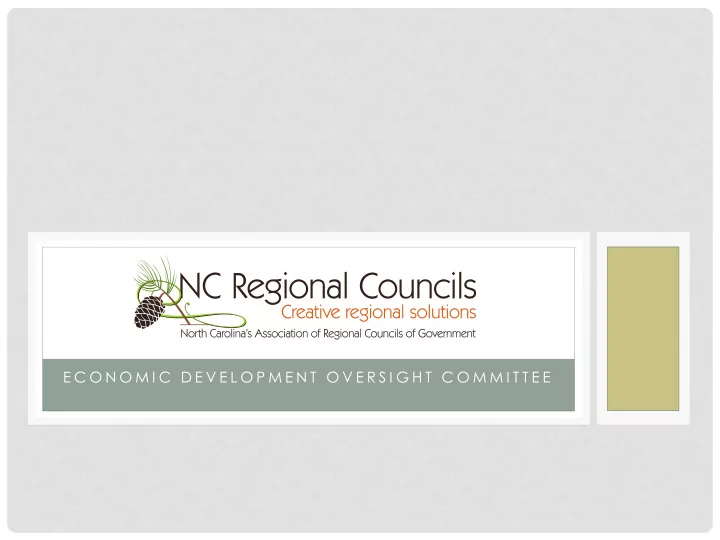

E C O N O M I C D E V E L O P M E N T O V E R S I G H T C O M M I T T E E
NC ASSOCIATION OF REGIONAL COUNCILS • North Carolina is served by 16 regional councils, not another layer of government but an extension of our local governments that offer a broad range of support services to our member governments including but not limited to: • Aging program services • Community & economic development • Workforce development • State & federal program management • Planning & GIS mapping services • Grant writing • Regional collaboration • Partnership building
OUR MISSION • Our mission is to provide “creative regional solutions” to relevant and emerging issues in North Carolina while providing a standard of excellence in the delivery of federal, state and regional services for our member communities.
WHEN REGIONS WERE ESTABLISHED • Regional councils in North Carolina are the result of 1968 federal legislation (A-95 Clearinghouse Review Process-Intergovernmental Cooperation Act) that charged the Department of Administration with developing “. . . a system of multi-county regional planning districts to cover the entire state” (GS 143 - 341) to reduce duplication of governmental services • Regional councils have been formally operating in the state since 1972 although many were organized long before the official state designation.
WHY WERE THEY ESTABLISHED • Established for closer cooperation between federal programs and state and local governments • Congress passed the Intergovernmental Cooperation Act in 1968 • NC passed (GS 143-341) creating a state-wide system through a process that gave local governments a choice of where the boundary lines were to be located
WHAT WAS THE PURPOSE THEN AND NOW • Regionalism emerged in the 50s across the country as a way to prevent duplication, reduce costs, foster inter- governmental cooperation and work on issues and opportunities that crossed jurisdictional boundary lines : i.e. The concept of RTP led to the Research Triangle Regional Commission (became Triangle J COG). • Concept became formalized in the late 60s: Cooperation between federal, state and local governments in the delivery of services
WHAT IS THE PURPOSE NOW? • Now: Regional councils are more important today because the critical issues(water resources, transportation infrastructure, etc.) cross boundary lines and resources are less • COGS are “owned and operated by local governments ” • Provide capacity building services for local governments i.e. Larger communities support COG assistance to small units of government in their region and builds efficiencies in government • State government recommends programs and services depending on need at the state level
WHO DOES WHAT IN NC Recruitment Statewide Infrastructure Marketing Job Creation Planning (Private Sector) Retention NCARC NCARC DOC DOT DOT NCPED DOC - CI DOC- CI CITIES DENR DENR COUNTIES DOE DHHS PRIVATE SECTOR NC Rural Center NC Rural Center Golden Leaf Foundation
HOW WE CURRENTLY FUNCTION
HOW WE CURRENTLY FUNCTION • Inter-Regional Cooperative Agreement • Dropped the boundary lines (530+ professionals across the state) • Self Policing – RPO Case Study • MOU with NCLM, NCACC and the Joint Regional Forum • Joint Regional Forum – Provides a forum for county and municipal leaders to discuss regional/state issues and seek solutions • NC Tomorrow – NC Strategy for Economic Development Federal (EDA & HUD) State (DOT, DENR, Commerce, Department of Agriculture) and Private Partners (SAS, Duke Energy, ESRI and the NC Rural Center)
QUESTIONS & MORE INFORMATION • ncregions.org • nctomorrow.org • Questions? • Contact: Betty or David Huskins Email: ncregions@ridgetopassociates.com
Recommend
More recommend